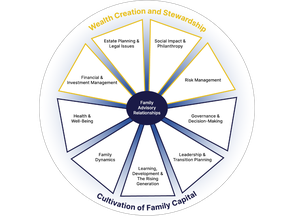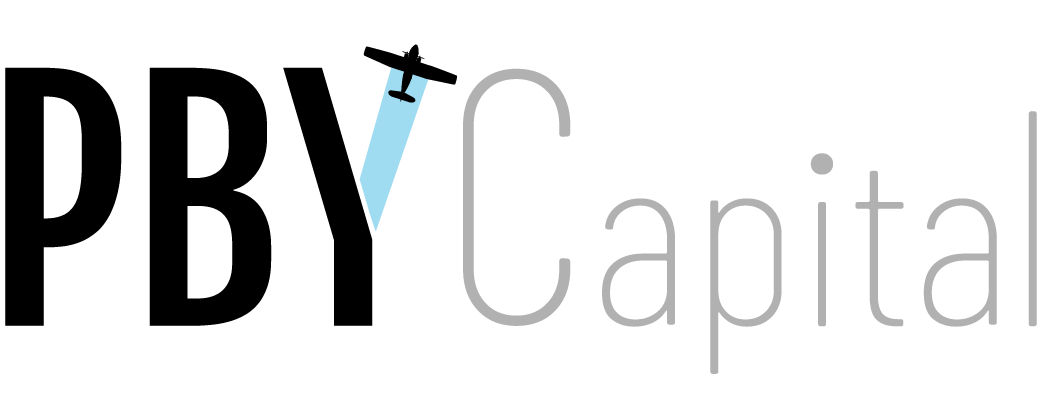What’s a family office, anyway? Ten Domains to guide them all
Model from UHNW Institute defines services, demonstrates importance of collaboration among wealth management professionals

Article content
(Second in a series. Check out the first article, about how Canadian Family Offices spurred a debate by publishing a list of multi-family offices in Canada: What is a family office, anyway? We inadvertently stirred the pot)
What services define a complete multi-family office? Professionals in this growing sector tend to draw the borders differently, but the desire for rigour and clarity is gaining consensus.
In particular, the U.S.-based Ultra High Net Worth Institute has defined the areas that a full family office might be expected to advise on with a formal model called the Ten Domains of Family Wealth. It shows how important it is for family-office professionals to break down the silos that separate disciplines.
To help demonstrate how the Domains relate to one another, the UHNW Institute presents them in chart form, with each service area ranged around a central point like the petals of a flower or spokes on a wheel. The four at the top are the “hard” technical services concerned with the broad realm of Wealth Creation and Stewardship. These are Financial & Investment Management; Estate Planning & Legal Issues; Social Impact & Philanthropy; and Risk Management.
The next five are the so-called “soft” services regarding the Cultivation of Family Capital. They are Governance & Decision-Making; Leadership & Transition Planning; Learning, Development & the Rising Generation; Family Dynamics; and Health & Well-Being.

“It started out at nine Domains,” says Moira Somers, a partner at Blackwood Family Enterprise Services in Winnipeg and the Ultra High Net Worth Institute’s Domain Chair for Family Dynamics. “And then it was recognized that the hub is really the integration, the bringing together of clients and advisors. That’s the centre, and that’s the mission of the institute, to make sure that we’re getting out of our silos.”
Therefore, the hub of the wheel (or the centre of the flower) became the Tenth Domain: Family Advisory Relationships.
Somers has served as a Domain Chair for about a year; she previously volunteered on the UHNW Institute faculty. By trade, she is a psychologist, family wealth consultant, professor and author of the book Advice That Sticks: How to Give Financial Advice That People Will Follow.
“Really, that’s what the institute is: a collective of people who want to transform how work is done in this space,” Somers says. “So, in addition to the Domain Chairs, who facilitate the learning in these areas, we work alongside people who have a deep and abiding interest in these areas.”
Jim Grubman, owner of Family Wealth Consulting in Boston and member of the institute’s board, helped spearhead the creation of the Domains and has worked to update and improve them over the past four years, with the help of Steve Prostano, the institute’s founder.
The institute’s work is all voluntary, and its focus for this year is on communication between Domains, Somers says, since “families are not well served by the ivory-tower model.”

Steve Legler, a family legacy consultant based in Montreal, says it feels like the whole industry is in a state of flux and growth.
“The Ten Domains is a great model for all of what a family office can be or could be, and it’s important to recognize that while just about every family will touch upon all of these at some time, it’s very rare that a family needs help in all of these at once,” he says.
One of the aims of the model is to draw attention to the importance of the five “Family Capital” services, which, he says, are often neglected. Whereas the success of a wealth-management strategy is clearly demonstrated on the balance sheet, the benefits of good succession planning or wellness advice are much more difficult to quantify.
Few professionals excel in both types of service. Those who specialize in the softer skills can lack the understanding of the complexity of wealth, Legler says (“they are well intentioned, but they don’t always understand the difference between a million dollars and a billion”). On the flip side, those versed in the technical side are rarely able to advise on softer matters, though they may try. “It’s very rare that you’ll meet a psychologist or family coach who says, ‘I can take care of your tax issues, too,’” Legler says.
So how does a firm cover off all the Domains?
“I think we’re still years away from people expecting that a family office truly offers a majority of the Ten Domains. And I’m not sure it would make sense for a lot of family offices to have all of those services,” he says. “Different families need services at different times; even some of the biggest banks in the U.S., if they have a family dynamics team at all, it’s probably three or four people for the whole country.”
The way forward, he says, is for leading firms to establish strong relationships with a range of affiliates so they always know whom to call in as a resource for their clients.
Multi-family offices in Canada spend most of their time working in the top four Domains, although Canadians have not yet embraced philanthropic work to the same extent as U.S. clients, says Judi Cunningham, founder of Trella Advisory Group in Toronto as well as the Institute of Family Enterprise Advisors.
Also, “you cannot find people who are really adept at family dynamics in the context of wealth,” she says.
“This was one of the reasons I started the Family Enterprise Advisor (FEA) program in 2007. There were lots of people who understood the top of the Ten Domains, but they didn’t understand all of the other stuff. That program was built to educate the advisors who were adept in the top four Domains about the Family Capital area.”
Since then, she says, Canadian professionals have gained ground compared to their U.S. counterparts.
“I would say that Canada, because of that program, has a much more sophisticated view of Family Capital, and that the people who have taken the FEA program would say the things on the bottom are not a frill,” she says. “I think they would definitely say the cultivation of the Family Capital is going to drive everything.”
But Somers says that no matter how technically adept an advisor may be, “it’s long been understood that the things that facilitate or torpedo matters within family business really boil down to the personal side of things. What we’re trying to do is to make sure that there’s just beautiful communication between professional groups about how to get better over the places where we should have crossover points.”
Ultimately, says Cunningham, “the Ten Domains are not what a family office should look like; these are the things that any family of wealth needs to attend to. How you attend to that could have any number of different permutations. Either you have to outsource people, or you have to do it inside.”
No matter how it’s arranged, she says, “you want to get the best service to a client, so if you need to collaborate, collaborate.”

Please visit here to see information about our standards of journalistic excellence.



